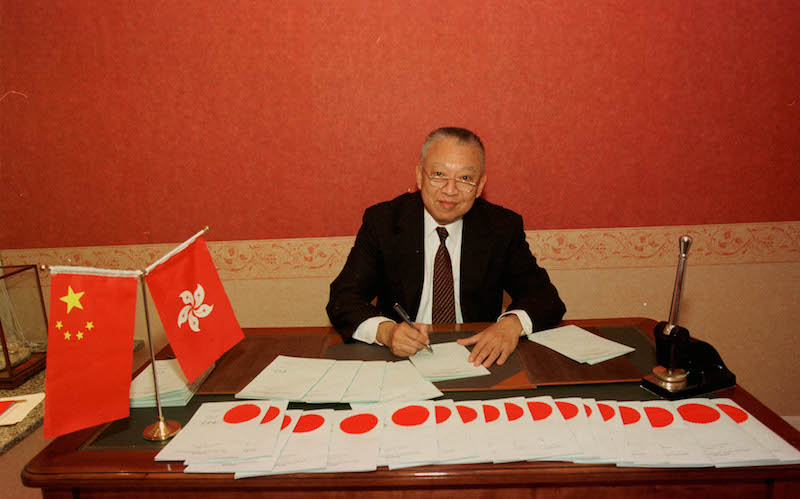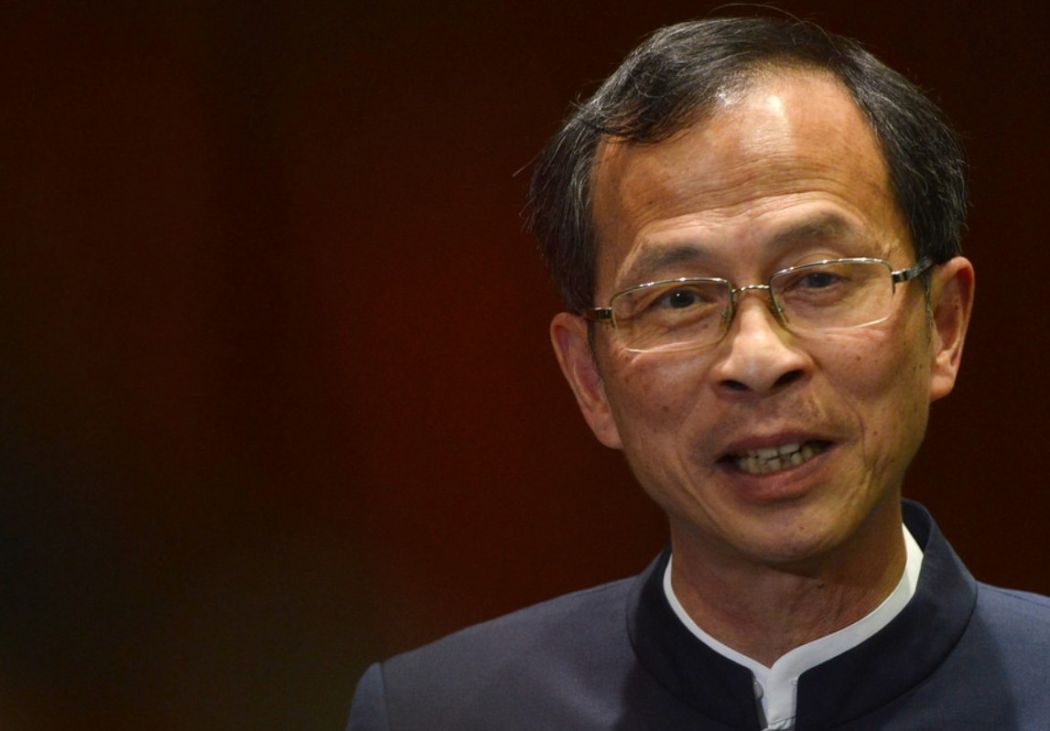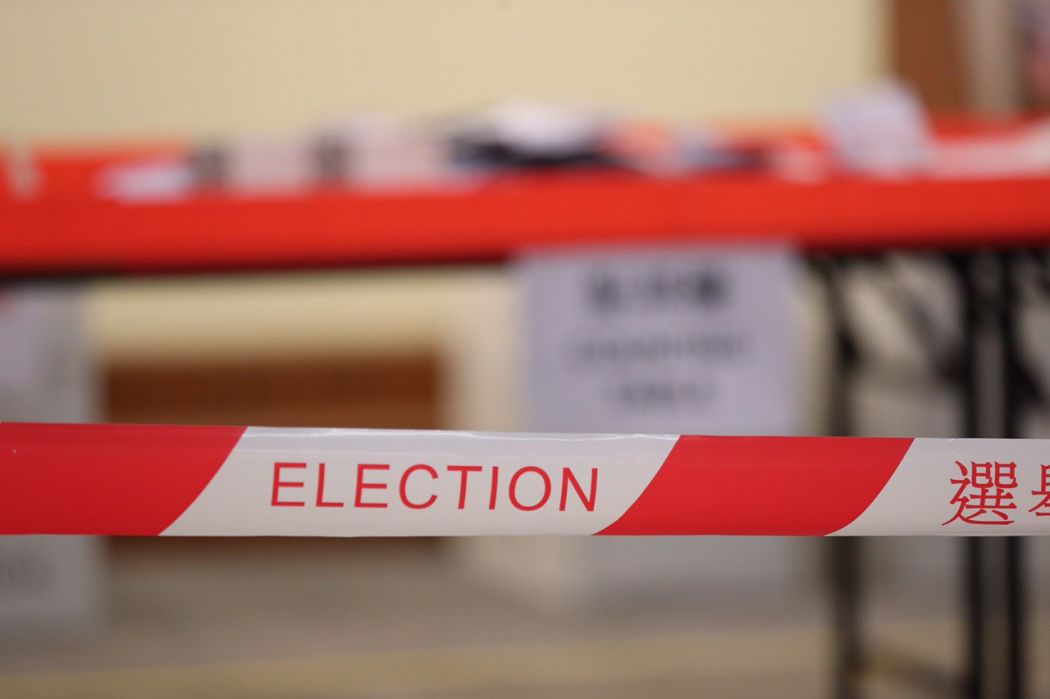For most of the past two years, a favourite subject for tea table gossip and speculation has been the political fate of Hong Kong’s Chief Executive Carrie Lam Cheng Yuet-ngor. She welcomed the return to what she called peace, quiet, and normality after the promulgation of Hong Kong’s new National Security Law last summer. Evidently, she didn’t anticipate that the new normal would give her own coalition more time to settle some scores of their own.
As a leading career civil servant, she won Beijing’s confidence when her abrasive predecessor, Leung Chun-ying, lost it in 2017. Her quieter non-partisan civil servant’s style was expected to calm troubled waters roiled by his combative personality and the growing popular strength of Hong Kong’s long-running democracy movement.

All those expectations and assumptions were soon forgotten. Probably because she is a civil servant first and foremost — and by her own frank admission knows nothing about politics — she has managed to say and do all the wrong things at the wrong time. As a result, her tenure has been even more tumultuous than that of her outspokenly partisan predecessor. Her lapses continue and so do the barbs. Only now they’re coming from a different direction.
Past precedents
In colonial days, before 1997, Hong Kong’s top official was known as the governor. Beijing’s political designers wanted a less powerful post, so it is now filled by chief executives. It has also become something of a poisoned chalice. They serve for five-year terms, limited to two in succession. But since 1997 no incumbent has yet succeeded in making it through two full five-year terms.
The question until recently has been whether Carrie Lam could stay the course for a full five years, much less 10. The question now is whether anyone can be found who actually wants the job.
Business tycoon Tung Chee-hwa was removed in March 2005, mid-way through his second term, ostensibly for health reasons. But that term had been disrupted by Hong Kong’s first mass uprising, provoked by the national security legislation he tried to force through Hong Kong’s legislature. The legislation is mandated by Article 23 of Hong Kong’s Basic Law that was drafted under Beijing’s supervision and promulgated in 1990, for use as the post-1997 constitution.

The mass march on July 1, 2003, occurred just after the all-clear had been sounded for a cross-border health crisis not unlike the current Covid-19 pandemic. This has proved far more contagious but less deadly than the 2003 Severe Acute Respiratory Syndrome. That, too, was an animal-borne disease but originated nearby, just across the border in neighboring Guangdong province.
The experience was a benchmark for Hong Kong’s democracy movement because the Chinese authorities then were even less forthcoming than they are now about the origins of the disease.
And like now, the lack of candour was rooted in Beijing’s hyper-sensitivity about political dissent and security, since in those days all information about epidemics was still treated as a state secret. The deaths of almost 300 Hongkongers fuelled public anger over the proposed legislation that was mandated by the same political security concerns.
Tung Chee-hwa’s successor was a respected career civil servant, Donald Tsang Yam-kuen. But his career ended under a cloud after he was found guilty of corrupt behaviour while in office. He served a prison term but was later cleared.
Beijing initially seemed to favour another member of the tycoon class as Tsang’s successor. But loyalist Leung Chun-ying proved a formidable candidate, probably because he wanted the job and actively campaigned for it whereas Henry Tang seemed content to inherit the mantle. By the time of his selection — for the 2012-17 Chief Executive term — C.Y. Leung had emerged as the more popular figure.

He took office on July 1 and his favorability rating lasted through the summer when he agreed to shelve plans for a new mandatory national political education course. The campaign against it was led by young Joshua Wong and his middle school classmates, in 2011-12.
But Leung had no patience with other aspects of Hong Kong’s burgeoning democracy movement and soon made himself one of its prime targets, especially during the 2014 Umbrella movement. He also became a one-term chief executive, presumably because of the enemies he made and the controversies his combative personality caused.
He was succeeded by his own chief secretary for administration, who is the second most powerful official in Hong Kong’s governing hierarchy, and thus Carrie Lam inherited the mantle in 2017.
2019: Gone by Christmas?
The speculation now is all about Lam’s fate come 2022, when she will have completed her first term. Some political pundits actually began predicting her downfall in mid-2019. That was soon after the protests began over her handling of a proposed extradition law. They erupted suddenly in June, to become the largest and most disruptive Hong Kong had ever seen — far greater and more intense than in 2003 or 2014.
Among other things, the proposed amendments would have allowed the extradition of Hongkongers to stand trial on the mainland for crimes allegedly committed there. Such arrangements had long been discussed and long delayed due to the sensitivities involved, only a few of which she was willing to acknowledge or address.

All manner of remedies were suggested and the debates continued throughout the spring of 2019. Business people with cross-border interests were uneasy about the potential pitfalls. But Lam would not budge. Contrary to widespread assumptions, usually reliable “sources” indicated that although Beijing naturally welcomed such legislation, officials there were not the prime movers.
The drive to push through the bill was evidently Lam’s, precipitated by the murder of a young Hong Kong woman in Taiwan. Her motive, she said, was to find a way of returning the alleged murderer, also a Hong Kong resident, to Taiwan for trial.
But innocent of politics as she happily admits to being, Lam failed to consider the wider political implications. And she was also concerned not to be seen to weaken by backing down in the face of popular pressure. One mistake was compounded by another, which she still refuses to acknowledge.
Later she was quoted as saying she had no idea Hongkongers lived in such fear of mainland court trials. She also said she was surprised by the sustained popular outburst. She and her equally detached advisers thought Hong Kong’s democracy movement had finally run its course after the multiple defeats suffered in recent years. Most important in this respect was the failure of the 2014 civil disobedience campaign for universal suffrage elections.

Ultimately, Lam agreed to suspend the legislative proceedings but not to withdraw the bill. Protests nevertheless continued to escalate. She finally withdrew the bill altogether in September — to the disgust of some loyalist hardliners and too late to win the gratitude of the protesters.
The speculation came from all sides, but mostly at first from pro-democracy sympathisers of the protest movement. She would be gone by Christmas, some said. Beijing would never tolerate such disruption born of such incompetence. That was Christmas 2019. She was still in office at year’s end but her departure seemed imminent. The gossip then revolved around who might replace her and how soon.
The next big date on the political calendar was the annual meeting of the National People’s Congress (NPC), normally held in early spring soon after the Lunar New Year holiday. Major announcements are often made at that time. But the NPC didn’t meet as usual in 2020. By March the coronavirus was spreading nationwide and had begun its race around the world. Congress met in abbreviated session a few months later.
The timing then became more difficult. The next big date would be Hong Kong’s next Legislative Council election, scheduled for September 2020. Probably the election campaign season would not be the best time to replace a chief executive. But then that election was postponed on the grounds of precautions against Covid.

The election would not be held until sometime in 2021 — not an easy year to change chief executives. Normally, discussions would begin in earnest during 2021, as the elaborate procedures for arranging the Chief Executive Election Committee for the 2022-27 term moved into high gear.
By then it would be too late to decide whether Lam should complete her first term, which pointed the way toward the next best solution: another one-term chief executive. Meanwhile, speculation about possible successors continued. They are few and far between but with the pretence of local autonomy now in clear retreat, Beijing’s approval is what matters first and foremost.
By late spring 2020, however, political tensions began intensifying, not because of protesters now but because of the expected backlash from Beijing. In late May came the feared announcement. Within a month, the central government had promulgated a National Security Law that aimed to outlaw the protest culture of 2019 and much more besides.
There was no speculation now about Lam’s imminent departure. She was everywhere. Beijing’s words were her words, the new rules were her rules. Ignoring the climate of fear that settled over the city as the new law went into effect after June 30, she carried out orders as only the most loyal of civil servants could.

Beijing sent mainland officials to oversee implementation of the new law and guide local authorities through its unfamiliar procedures. At the opening ceremony of the new mainland-staffed Office for Safeguarding National Security in Causeway Bay on July 8, 2020, a beaming Carrie Lam hailed it as a “historic day” for Hong Kong.
2022: Another one-term leader?
The local political scene has now changed beyond recognition. This upheaval followed the disqualification or resignation in late 2020 of almost all the remaining pro-democracy representatives in the Legislative Council. One final blow came in early 2021, with the arrest on national security grounds of all the potential candidates for the postponed September 2020 Legislative Council election.
Democratic voices — representing a majority of Hong Kong’s voting public — are silenced and gone. The coalition of pro-Beijing loyalists and pro-establishment conservatives suddenly found themselves occupying the entire space they had previously been forced to share with their pro-democracy opponents.

At the onset of the 2019 extradition law crisis, democrats and the others were not protesting in unison but all had aimed their barbs at Lam from one direction or the other. Now conservatives and loyalists have the stage to themselves and Lam is still in their sights. The endgame for these partisans is not yet clear but apparently one aim is to deprive her of a second term. Another is to begin the search for a replacement.
Soon after the new national security regime was inaugurated last summer, pro-Beijing loyalists seemed resigned to her continuing in office. But Hong Kong’s political arena was shrinking fast. By year’s end loyalists were beginning to realise they had been liberated from the rigours of automatic partisan defense against their adversaries because democrats no longer signified.
In this new environment Lam’s enthusiasm for the new order was not enough to protect her. Once again she has become fair game, this time from members of the coalition whose approval she needs for a second term.
The most unexpected blow came from the dean of pro-Beijing political leaders, Jasper Tsang Yok-sing. His loyalist credentials date back to his student days in the 1960s. During the years since then, he became founding chairman of Hong Kong’s largest political party — the Democratic Alliance for the Betterment and Progress of Hong Kong (DAB); was elected to the Legislative Council; and served as its presiding officer or president from 2008 to 2016.

Tsang’s easy-going manner has won him the trust of many moderates outside the loyalist camp. But his moderation has also sometimes put him at odds with those who prefer the combative approach of Beijing leaders and most loyalist politicians here.
Hence his motives are difficult to divine. But at a forum on November 20 last year, Tsang joked that perhaps he was responsible for the Legislative Councl’s current disqualifications and resignations. Maybe he had been too lenient with the pro-democracy caucus during his stint as council president.
Tsang was then asked what he would do if he were chief executive now, in Hong Kong’s current environment. His response was widely reported in the Chinese-language media but less so in English. Tsang said he would have resigned early on.
At the same forum, commenting on the growing crescendo of demands from Beijing that only tried and true “patriots” should govern Hong Kong, he reportedly said patriotism was necessary but not sufficient. They should also be capable leaders and enjoy public support.

These veiled references were left unexplained. But Tsang himself later came under fire when he joined the current debate in loyalist circles about reforming the chief executive selection procedure.
Former Chief Executive C.Y. Leung says the old-fashioned simple way of “consultation” is good enough and used his blog site to make the case. Lam and Tsang Yok-sing are arguing that the cumbersome post-1997 Selection Committee method should be retained.
Universal suffrage for chief executive elections has been a key demand of pro-democracy reformers since before the possibility was written into Hong Kong’s Basic Law. Beijing is now reportedly planning changes in the composition of the loyalist-dominated committee aimed at further reducing non-loyalist participation.
Worth noting in this developing controversy over consultation versus small-circle election, only Tsang Yok-sing has actually won direct voter support – during his years as a directly elected Legislative Councilor. In 2012, C.Y. Leung received just 689 votes from the 1,200-member election committee. Lam’s vote count in 2017 was 777.

Also worth noting: by reason of their rank and experience, these three are the top-tier possibilities for 2022. All come with some serious political baggage and Lam’s detractors are legion.
But for now, those straws-in-the-wind are not the pro-establishment lawmakers, tycoons, and kingpins with their reserved seats on the Election Committee. More interesting are the loyalist commentators and opinion leaders who began making social media waves late last year by focusing especially on Lam’s handling of the coronavirus health crisis.
C.Y. Leung was among those who championed the mainland method of epidemic control — neighborhood lockdowns with mandatory testing. Lam had initially resisted this course as did medical experts here.
But in the midst of this controversy, Lam’s in-person duty visit to Beijing was abruptly cancelled and Xi Jinping himself came online with a video link virtual response to her virtual work report. This gave him a public audience and he used the occasion to express his concern about Hong Kong’s failure to contain the virus.

Hong Kong then began scattered neighbourhood lockdowns and compulsory testing with mixed results, fines for non-compliance, and much criticism from residents.
Testing the waters?
Perhaps the sudden loyalist flare-up of anti-Carrie commentaries in December had a common purpose. It might have been to try to define the case against her. Or it might have been to assess the strength of her support base within the different segments of the pro-Beijing community that includes committed patriots, establishment elites, and new mainland arrivals. Or it might have been to encourage potential rival candidates to showcase their leadership skills by building the case against her.
Perhaps the exercise originated in Beijing, or it might have just been a local initiative as preparations begin for the next chief executive term.
But for all the turmoil of her years in office, Lam seems to have learned nothing from the political currents swirling around her. Her one-dimensional concept of the chief executive’s role remains unchanged.
In October last year Lam decided to cancel the Legislative Council’s British-style Question Time, saying it served no purpose. She was tired of the insults she had to endure there from pro-democracy legislators.

After the wave of disqualifications and resignations removed almost all of them from the chamber in November, Lam resumed the question-answer sessions saying she was happy to do so — now that the proceedings had returned to “normal.” With close to half the council’s seats empty before her, she might have used some word other than normal. She also said such sessions can now show how the executive and legislative branches of government work to check and balance each other.
She had just presented her annual Policy Address to the council and declared herself full of renewed vigour and confidence. So much so that she gave multiple media interviews soon afterwards. In its full-page write-up on November 30, the South China Morning Post reported that Lam had proclaimed her own return to normal. She said she was her old self again and even defended her handling of the anti-extradition law upheaval.
She avoided questions about a second term. But perhaps the sudden flare-up of critical commentaries in December was provoked by her arrogant proclamation of no regrets and no apologies for her performance in “one of the toughest jobs for any leader in the world.”
Support HKFP | Policies & Ethics | Error/typo? | Contact Us | Newsletter | Transparency & Annual Report | Apps
Help safeguard press freedom & keep HKFP free for all readers by supporting our team
| HKFP is an impartial platform & does not necessarily share the views of opinion writers or advertisers. HKFP presents a diversity of views & regularly invites figures across the political spectrum to write for us. Press freedom is guaranteed under the Basic Law, security law, Bill of Rights and Chinese constitution. Opinion pieces aim to point out errors or defects in the government, law or policies, or aim to suggest ideas or alterations via legal means without an intention of hatred, discontent or hostility against the authorities or other communities. |

More HKFP OPINION:
HKFP has an impartial stance, transparent funding, and balanced coverage guided by an Ethics Code and Corrections Policy.
Support press freedom & help us surpass 1,000 monthly Patrons: 100% independent, governed by an ethics code & not-for-profit.










